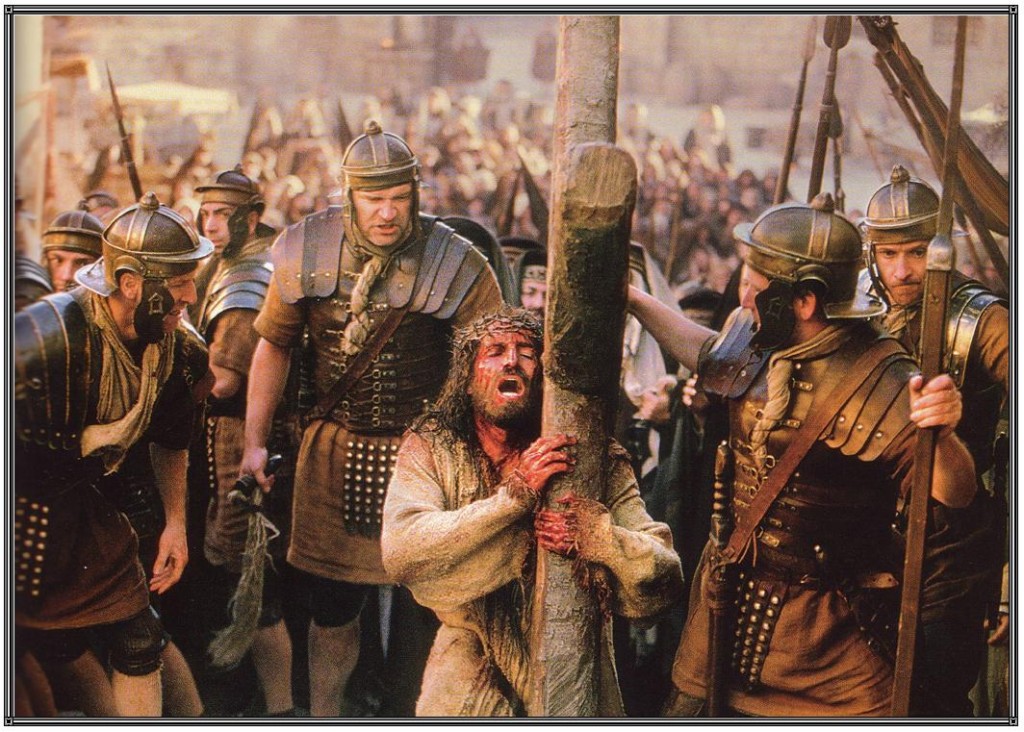Quotation on the scroll is from the Epistola Ad Milites Coroti, one of the two remaining authentic writings of St. Patrick (d. AD 432).
Suicides are increasing among parents, spouses, children, and siblings of veterans.
“I was pretty afraid of my dad when he came back from Iraq. I didn’t know who this man…You can’t forget being terrified of your parent and terrified for your life.”
“I am married to a Marine who has been through five deployments…I think that I had just been lonely for so long that it felt like maybe I didn’t matter.”
“I lost my daughter two years later. She took her life over the death of her brother. She couldn’t handle the pain of her brother’s death.”
“I hadn’t even begun to comprehend Freddie’s death. He was killed in action. How could my brother take his life? I had lost my whole family, and all I could think about would it would be better if I was gone too.”
in the Gospel of Saint John, the story of the passion of the Christ.
John 18: “So Judas got a band of soldiers and guards from the chief priests and the Pharisees and went there with lanterns, torches, and weapons….”
…So the band of soldiers, the tribune, and the Jewish guards seized Jesus, bound him, and brought him to Annas first.
…And the soldiers wove a crown out of thorns and placed it on his head, and clothed him in a purple cloak, and they came to him and said, Hail, King of the Jews! And they struck him repeatedly.”
 “Now since it was preparation day, in order that the bodies might not remain on the cross on the sabbath, for the sabbath day of that week was a solemn one, the Jews asked Pilate that their legs be broken and that they be taken down. So the soldiers came and broke the legs of the first
“Now since it was preparation day, in order that the bodies might not remain on the cross on the sabbath, for the sabbath day of that week was a solemn one, the Jews asked Pilate that their legs be broken and that they be taken down. So the soldiers came and broke the legs of the first
and then of the other one who was crucified with Jesus. But when they came to Jesus and saw that he was already dead, they did not break his legs, but one soldier thrust his lance into his side, and immediately blood and water flowed out.”
John 19: “When the soldiers had crucified Jesus, they took his clothes and divided them into four shares, a share for each soldier. They also took his tunic, but the tunic was seamless, woven in one piece from the top down. So they said to one another, “Let’s not tear it, but cast lots for it to see whose it will be, “ in order that the passage of Scripture might be fulfilled that says: They divided my garments among them, and for my vesture they cast lots…”
“This is what the soldiers did.”
On the Humans of New York Facebook page, where they publish photos of everyday New Yorkers alongside a short snippet of conversation with the subject.
“It took me getting into a lot of fights before I was diagnosed with PTSD. I have something called ‘hypervigilance.’ I get really nervous around people. Especially people from the Middle East.”
“What were some traumatic things that happened to you?”
“I was in a vehicle when a mortar round exploded in front of us, and we fell into the crater and got trapped. There was a burning oil rig near us, so it was like being in a microwave. And we couldn’t get out. And I also saw a lot of hanky shit. Mostly from our side. Everyone was really revved up from 9/11. We did a lot of bad things. I saw decapitations, and that was our guys doing it.”
“What happened?”
“We were supposed to bring POW’s back to the base. But instead we gave them a cigarette to calm them down, and told them to get on their knees. One of our guys was 240 lbs, and he’d taken this shovel we’d been issued, and he’d sharpened one of the sides until it was like an axe, and he could take off somebody’s head with two hits.”
“How many times did you see that happen?”
“Three.”
From Catholic.org:
Casimir (1461 – 1484) grew up in a world where his life was not his own. As a prince of Poland, the second son of King Casimir IV and Elizabeth of Austria, his life was scheduled to cement his father’s authority and increase Poland’s power. Casimir realized from an early age that his life belonged to someone else, but to a much higher King than his father. Despite pressure, humiliation, and rejection, he stood by that loyalty through his whole life.
…Though his father must have wondered about him, he must have seen and admired Casimir’s strength. He showed that he misunderstood this strength when he sent Casimir as head of an army to take over the throne of Hungary at the request of some nobles there. Casimir felt the whole expedition was wrong but was convinced to go out of obedience to his father. He could not help but feel at every step that it was disobedient to his other Father. So when soldiers started deserting, he was only too glad to listen to the advice of his officers and turn back home. His feelings were confirmed when he discovered that Pope Sixtus IV had opposed the move.
His father, however, was furious at being deterred from his plans and banished Casimir to a castle in Dobzki, hoping that imprisonment would change Casimir’s mind. Casimir’s commitment to what he believed was right only grew stronger in his exile and he refused to cooperate with his father’s plans any more despite the pressure to give in. He even rejected a marriage alliance his father tried to form. He participated in his true King’s plans wholeheartedly by praying, studying, and helping the poor.
He died at the age of 23 in 1484 from lung disease. He was buried with his favorite song, a Latin hymn to Mary called “Omni die dic Mariae” which we know as “Daily, Daily Sing to Mary.” Because of his love for the song, it is known as the Hymn of St. Casimir though he didn’t write it.
In the first three centuries, there was an almost constant persecution of Christians. It did happen, however, that some emperors, more benevolent than others, revoked the severe decrees against Christians, but this did not prevent local governors from bringing them to trial – if not directly for their faith, then for insubordination. For example, when a soldier entered the army or received a promotion, he had to take an oath, invoking the names of pagan gods, and sometimes he had to take part in pagan rituals. Christians could not agree to this, and they were given over to punishment for disobedience. There were many such cases under Emperor Gallienus (ruled 260-268), who forbade persecuting Christians for their faith.
St. Marinus belonged to a noble family of Caesarea, in Palestine and had been an excellent soldier in the army. He was about to be honoured with the new title and position of Centurion. Suddenly another soldier who was eager for the same position, rushed forward, crying out, “Marinus is a Christian, and he would not sacrifice to the Emperor!”
Marinus lost his new position and was immediately questioned by Achaeus, the Governor. Marinus spoke up “Yes, I am a Christian and it is true, I did not sacrifice to the Emperor.”
Achaeus was very bold, “Then I give you three hours in which to change your mind and give up your beliefs.”
As Marinus left the judgment hall, he met Bishop Theotecnus of Caesarea. The Bishop led him to the Church and made him stand close to the altar saying, “Choose between the sword that you carry by your side, and the book of the Gospels.” Marinus immediately stretched out his hand and took the book of the Gospels, holding it firmly. “Hold fast then to God, commanded the Bishop, that strengthened by Him you may obtain what you have chosen! Go in peace.”
Marinus returned to the judge stating firmly, “I am a Christian and I wish to remain so!” He was immediately led away, to be killed.
St. Astyrius (Asterius), a Roman Senator, was present at the martyrdom. Taking off his cloak, he wrapped up the body of Marinus. Astyrius carried the body away on his shoulders and buried it with great honour. Later, in the year 260 A. D., Astyrius also became a martyr.
The words of a student of Jim O’Connor, a 70-year-old veteran of the Vietnam War who teaches math at a Catholic high school. Never married, no kids of his own. Find out what he does in his free time. A truly heartwarming story.
John O’Connor, we salute you.
If only every student at a Catholic high school or college was required to read this book! I am reading it now and highly recommend it.
This book is a history of the peace tradition in the Roman Catholic Church from the time of the Gospels to the twentieth century. Its purpose is to show that there is a continuing, unbroken, and self-sustaining stream within Catholicism from the martyrs and pacifists of the early church to John XXIII and the peacemakers of our time.
Read the reviews on Amazon.
 The origin of St. Valentine, and how many St. Valentines there were, remains a mystery. One legend is that he was a Roman martyred during the reign of Claudius during the 3rd century around 270 A.D. The Roman Empire needed soldiers to protect their ever-expanding territories. Claudius had decided that unmarried men made better soldiers, so he decreed that young men could not marry, effectively putting a ban on marriage (one of the defining aspects of militarism: subjecting all interests to the interests of the military). Legend has it that Saint Valentine defied the Emperor’s command and clandestinely married off young couples, leading to his imprisonment and death.
The origin of St. Valentine, and how many St. Valentines there were, remains a mystery. One legend is that he was a Roman martyred during the reign of Claudius during the 3rd century around 270 A.D. The Roman Empire needed soldiers to protect their ever-expanding territories. Claudius had decided that unmarried men made better soldiers, so he decreed that young men could not marry, effectively putting a ban on marriage (one of the defining aspects of militarism: subjecting all interests to the interests of the military). Legend has it that Saint Valentine defied the Emperor’s command and clandestinely married off young couples, leading to his imprisonment and death.